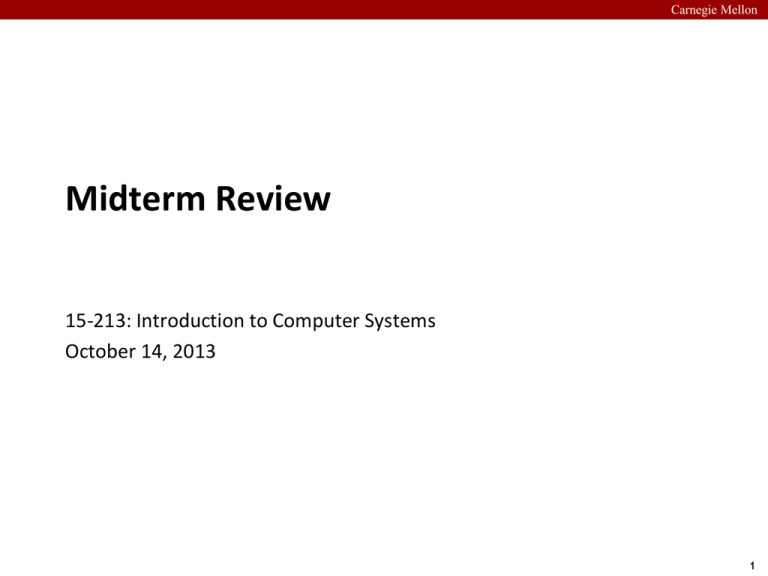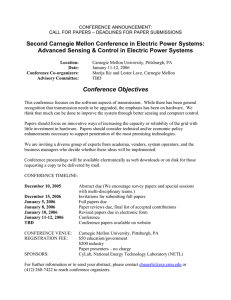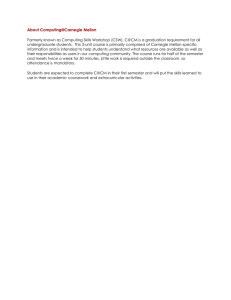Midterm Review 15-213: Introduction to Computer Systems October 14, 2013 Carnegie Mellon
advertisement

Carnegie Mellon
Midterm Review
15-213: Introduction to Computer Systems
October 14, 2013
1
Carnegie Mellon
Agenda
Midterm
Brief Overview of few Topics
Practice Questions
2
Carnegie Mellon
Midterm
Wed Oct 16th to Sun Oct 20th.
Check timings for each day on the website
Duration - 80 minutes nominal time, but you can have upto 4 hrs to
finish the exam.
Cheat Sheet – ONE double sided 8 ½ x 11 paper
No worked out problems in that sheet.
What to study?
Chapters 1-3 and Chapter 6
Note that in previous years, Chapter 6 (memory hierarchy) was
covered by Exam 2
How to Study?
Read each chapter 3 times, work practice problems and do
problems from previous exams.
3
Carnegie Mellon
Floating Point
Sign, Exponent, Mantissa
(−1)𝑠×𝑀×2𝐸
Bias (2𝑘−1 − 1)
Denormalized
exp = 000…000
E = 1 – bias
Small values close to zero.
Special Values
exp = 111…111
+/-inf, NaN
4
Carnegie Mellon
Floating Point(contd)
Normalized
exp != 0 and exp != all ones
E = exp – bias
Rounding
Round-up – if the spilled bits are greater than half
Round-down – if the spilled bits are less than half
Round to even – if the spilled bits is exactly equal to half
5
Carnegie Mellon
6
Carnegie Mellon
ASSEMBLY REVIEW
7
Carnegie Mellon
Assembly Loop
8
Carnegie Mellon
Assembly Loop
void mystery(int *array, int n)
{
int i;
for(________; ________; _______)
{
if(___________ == 0)
___________;
}
}
9
Carnegie Mellon
Assembly – Stack
How arguments are passed to a function
IA-32
X86-64
Return value from a function
How these instructions modify stack
call, leave, ret
pop, push
10
Carnegie Mellon
Given assembly code of foo() and bar(), Draw a detailed
picture of the stack, starting with the caller invoking foo(3,
4, 5).
11
Carnegie Mellon
12
Carnegie Mellon
Array Access
Start with the C code
Then look at the assembly Work backwards!
Easiest to just do an example
13
Carnegie Mellon
Find H,J
14
Carnegie Mellon
Caching Concepts
Dimensions: S, E, B
S: Number of sets
E: Associativity – number of lines per set
B: Block size – number of bytes per block (1 block per line)
Given Values for S,E,B,m
Find which address maps to which set
Is it a Hit/Miss. Is there an eviction
Hit rate/Miss rate
15
Carnegie Mellon
Questions/Advice
Relax!
Work Past exams!
Email us - (15-213-staff@cs.cmu.edu)
16



